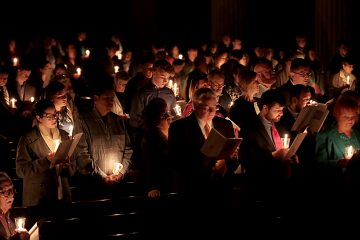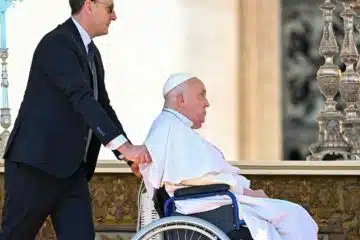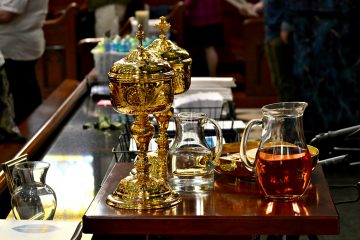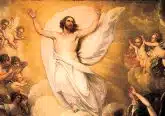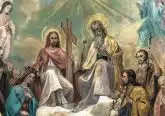Purity, the Flesh and the Spirit

 Note: This article is part of an ongoing series on Pope St. John Paul II’s “Theology of the Body” (TOB).
Note: This article is part of an ongoing series on Pope St. John Paul II’s “Theology of the Body” (TOB).
Central to Jesus’ moral teaching, which I have referred to as the New Law of the Gospel, is His appeal to the human heart. In his Theology of the Body (TOB), Pope St. John Paul II meditated deeply on this interior turn and its implications for men and women as sexual beings.
According to the late pope, “moral purity” in the Old Covenant “was often understood in an exclusively external and ‘material’ way” (TOB 50:3). Jesus shifts the locus of morality to the heart: “According to Christ’s words, true ‘purity’ (as well as ‘impurity’) has its seat in the ‘heart’ and proceeds ‘from’ the human ‘heart’” (TOB 52:3). “For from within, out of the heart of man, come evil thoughts, fornication, theft, murder, adultery, coveting, wickedness, deceit, licentiousness, envy, slander, pride, foolishness” (Mk. 7:21-22). From this list, it is clear that purity of heart goes beyond the sphere of sexuality alone and encompasses every aspect of our moral life: “every moral good is a manifestation of purity and every moral evil a manifestation of impurity” (TOB 50:4).
In order to further shed light on purity of heart and how we can experience it, Pope St. John Paul II plumbed the letters of St. Paul. In various places (e.g., Gal. 5), St. Paul contrasts the works of the flesh and the works of the spirit. This contrast has given rise to some confusion around the goodness of the body and sexuality. As discussed in previous reflections, Catholic teaching has consistently affirmed the inherent goodness of the human body and sexuality. Pope St. John Paul II in particular saw human sexuality revealed by our bodies as a “a value not sufficiently appreciated” (TOB 45:3).
How does this square with St. Paul’s teaching on the flesh and the spirit? According to the pope, “The issue is not just the body (matter) and spirit (the soul) as two essentially distinct anthropological components that have from the ‘beginning’ constituted man’s very essence” (TOB 51:1). In other words, man is a unit of body and soul, and both are essential to
his nature. Both participate in the dignity of being a son or daughter of God, made in His divine image. Rather, St. Paul “has in mind the tension that exists in man’s innermost [being]” due to original sin (TOB 51:1). Because of our first parents’ sin, all of us inherit a wounded human nature that is prone to disharmony, disease and death. One aspect of this disharmony is our proclivity to disordered desire known as concupiscence. When St. Paul speaks about “the flesh,” he is not speaking about the body per se but “has in mind the tension that exists in man’s innermost [being], in his ‘heart’” due to the “disposition of powers formed in man together with original sin,” namely concupiscence (TOB 51:1).
Furthermore, when St. Paul speaks about the “spirit” and “life according to the spirit,” he is typically not speaking merely of the human soul, which is always intimately associated with the body, but primarily about the Holy Spirit given to us by Jesus. We often fail to appreciate that a central purpose of Christ’s redemption was the outpouring of the Holy Spirit. Indeed, central to St. Paul’s teaching on redemption is “the power of Christ himself working in man’s innermost [being] through the Holy Spirit” (TOB 51:3). He said, “The one who raised Jesus from the dead will give life also to your mortal bodies by his Spirit, which dwells in you” (Rom. 8:11). According to John Paul II, St. Paul is not referring here only to the resurrection at the end of time but to the power of Christ’s redemption at work in us even now.
It is by the power of the Holy Spirit working in us that our hearts can be transformed as Christ has called them to be. Through the indwelling of the Holy Spirit, Christ’s redemption becomes “a real power at work in man that reveals and affirms itself in his actions” (TOB 51:4). In future reflections, we will explore the difference between life in the Spirit and life according to the flesh and how, by cooperating with the Holy Spirit in our hearts, we can experience true freedom to love.
 Dr. Andrew Sodergren, MTS, PSY.D is a Catholic psychologist and director of psychological services for Ruah Woods. He speaks on the integration of psychology and the Catholic faith. He and his wife, Ellie, have five children.
Dr. Andrew Sodergren, MTS, PSY.D is a Catholic psychologist and director of psychological services for Ruah Woods. He speaks on the integration of psychology and the Catholic faith. He and his wife, Ellie, have five children.
This article appeared in the May 2024 edition ofThe Catholic Telegraph Magazine. For your complimentary subscription, click here







